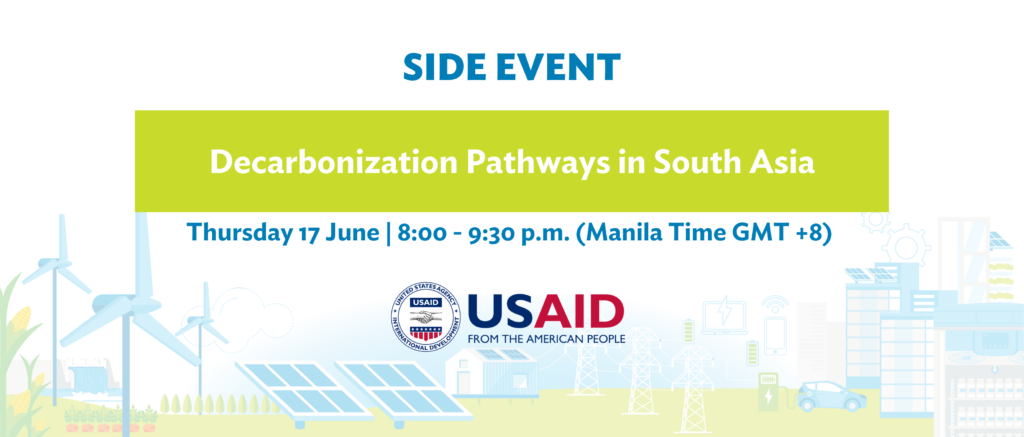Background
This is the decisive decade for actions against climate change. Catalyzing global ambitions to address the climate crisis need collective action that is immediate, bold, and fast with the vital goal to limit global warming to 1.5 degrees Celsius.
A clean energy future needs accelerated renewable energy development and deployment with a firm focus on meeting energy efficiency targets as a policy goal to reap economic benefits and social good. The United States Biden-Harris administration’s bold climate efforts include the recently launched Global Climate Ambition Initiative through which the United States government is working to support partner countries in establishing net-zero strategies, implementing their nationally determined contributions and national adaptation strategies, and reporting on their progress under the Paris Agreement. As part of this ambition, the United States Agency for International Development (USAID) launched the “Energizing a Net-Zero Asia” initiative that totals over $200 million in value and commits to establish foundations for a net-zero energy grid in Asia. In South Asia, USAID through its ongoing regional programs “South Asia Group on Energy (SAGE)” and the “South Asia Regional Energy Hub (SAREH)” supports in implementation of shared vision of a clean energy and climate resilient South Asia.
USAID is hosting a side event highlighting “Decarbonization Pathways for South Asia” as a part of Asia Clean Energy Forum - ACEF 2021, themed on Accelerating the Low Carbon Transition in Asia and the Pacific. The virtual event will showcase the United States administration priorities on climate change and USAID’s role in faster and deeper decarbonization in the region. The side event will have a sectoral focus on power, industry, buildings, and transportation. It will delve into existing barriers, possible solutions, and future pathways that policy, research, and meaningful engagement can enable as decarbonization tactics.
The program opens with SAGE setting the context, followed by a panel discussion comprising government and private sector leaders, both significant stakeholders in policy and business decisions, in a rapidly changing environment.
The panel discussion will cover:
- What would it take, in terms of technological breakthroughs, cost implications, as well as, policy and regulatory environment enhancements, to commit to fully decarbonize?
- Are there technology or policy barriers?
- Are there gaps in communication when it comes to knowledge sharing data mining, and analytics?
Objectives
- Share insights on existing barriers, opportunities, and potential ideas to accelerate decarbonization in South Asia in select sectors
- Stimulate discussions on the policy and regulatory frameworks by government, and voluntary actions by private sector to support decarbonization
Agenda
| Time (Manila) | Activities |
|---|---|
| 08:00-08:02 p.m. |
Opening & Introduction Ms. Monali Zeya Hazra, Regional Energy Manager and Clean Energy Specialist, USAID/India |
| 08:02-08:05 p.m. |
Welcome remarks Ms. Julia Kennedy, Director, Indo Pacific Office (A), USAID/India |
| 08:05 pm – 08:32 p.m. |
Context setting presentation on decarbonization in power, industry, buildings and transport sector by SAGE
|
| 08:32 pm – 09:17 p.m. |
Panel discussion Chair & Moderation Dr. Kirit Parikh (Chairperson, Integrated Research and Action for Development, and Former Member, Planning Commission, Government of India) Panelists
|
| 09:17 pm – 09:30 p.m. | Audience Q&A and wrap up |
About Organizers
The United States Agency for International Development (USAID) is the lead U.S. Government agency that works to end extreme global poverty and enable resilient, democratic societies to realize their potential. USAID’s work safeguards this mission and puts countries on a path to pursue clean energy growth and resilient, low-carbon development. Countries around the world are feeling the effects of climate change, from more intense heat waves, droughts, floods and storms to slower-moving changes like ocean acidification. USAID is sharing world-class knowledge, data and tools to ensure countries can predict, prepare for and adapt to change. USAID also helps countries lay the foundations for sustainable growth powered by clean energy and healthy landscapes.
The South Asia Regional Energy Hub (SAREH) is USAID’s central coordination, communication, and technical support platform for host country stakeholders, private sector, and energy program implementing partners. The United States Energy Association (USEA) is SAREH’s implementing partner.
The South Asia Group for Energy (SAGE) is a consortium comprising USAID, the United States Department of Energy (DOE) and three national laboratories: the Lawrence Berkeley National Laboratory (LBNL), the National Renewable Energy Laboratory (NREL) and the Pacific Northwest National Laboratory (PNNL). The consortium represents excellence in research and international development in the energy sector to advance the Asia Enhancing Development and Growth through Energy (Asia EDGE) priorities in the South Asia region.
Point of Contact
Monali Zeya Hazra, USAID
Email: mhazra@usaid.gov


You must be logged in to post a comment.